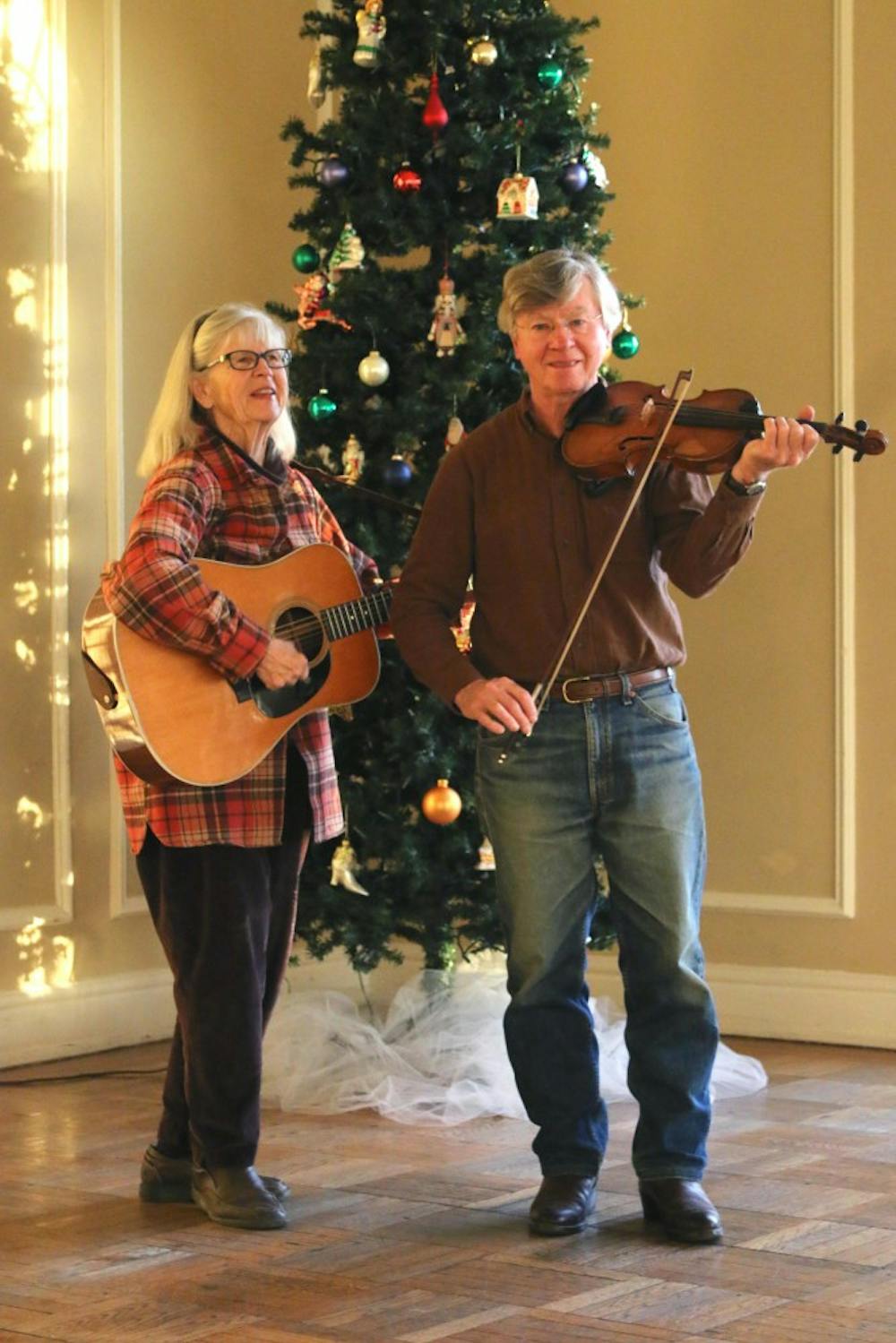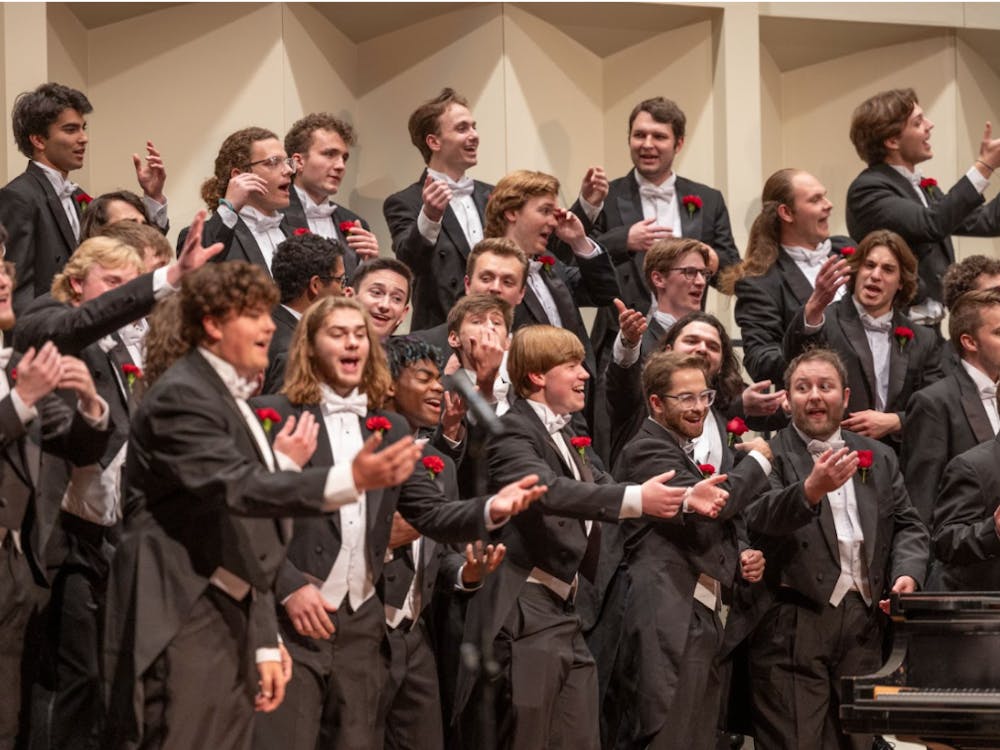In the main room of Miami University's Interfaith Center, Judy and Warren Waldron are playing music. Most of the color is gone from their hair, but their hands and fingers are still quick and lively. Judy plucks at the strings of her banjo while Warren's bow moves back and forth across the neck of his fiddle. Together, they sing: "Free, little bird, as I can be; free, little bird, as I can be; build my nest in a wide oak tree, where the bad boys, they cannot bother me."
They are playing what some call "mountain music" -- music born in the steep hills of Appalachia.
It's traditional folk bluegrass, characterized by acoustic string instruments such as banjo, fiddle, guitar, mandolin or bass.
But, neither Judy nor Warren were born in the mountains.
Warren, a '79 Miami University alum and current clerical assistant in Miami's general accounting, grew up in Cleveland Heights, Ohio. Judy, who is on the board of the Interfaith Center, got her Masters from Miami in 1969 and is originally from Springfield, Ohio.
Judy's mother was constantly playing the piano -- everything from Duke Ellington to the Spanish-inspired tunes she'd picked up in New Mexico. Judy herself began taking piano lessons at Wittenberg University at six years old.
Warren began learning piano around the same age, although he rebelled against it. He played trombone throughout high school, but it wasn't until he joined a jazz band that he really began to appreciate music. He took a banjo class and taught himself traditional tunes by buying Appalachian records and playing along by ear.
In 1971, Warren went to a community square dance for the greater Cleveland area.
This was a time of societal upheaval, the Vietnam War, the countercultural movement and great divisions among American people.
But when Warren looked out on that dance floor, he saw something that truly touched him.
"Everybody was there -- young people, old people, kids, hippies, guys who were in the army," he said. "But everybody was together, smiling, having a big time, happy, dancing."
In that moment, Warren knew what his purpose in life was going to be.
Enjoy what you're reading?
Signup for our newsletter
"Whatever else I do with my life, this is gonna certainly be part of it," he said.
Judy had a similar attraction to Appalachian music while in college. She loved the sound of it, but it wasn't until she heard original recordings of traditional songs from the 1930s that she fell in love with it.
As someone who had grown up outside the culture of Appalachia, Judy connected with the soul and sincerity of those who had called the region home.
"This stuff sings about stuff we never talk about," she said. "It's very powerful. It's very raw. It's very primitive. And it's real. Nobody's showing off."
Warren and a hometown friend would play traditional music in Oxford's town square, where he and Judy met. He played banjo, and she played guitar. They've been playing together ever since.
"Boy, did we play," Warren said.
They played in the town square, at churches and in Miami's Shriver Center ballroom for students, faculty and townspeople. During the summers they even played at Cedar Point.
They formed three bands with fellow players throughout the years: Full Moon Country Dance Orchestra (named after the teenagers who mooned them during a dance), Rabbit Hash String Band and Jericho Old Time Band (named after their farm).
In the 1980s, they started doing public square dances at Oxford's Community Arts Center, a tradition still going strong today.
"You feel like you gotta share," Judy said. "We believe community is built by touching one another and being with one another."
Decades later, music means just as much to the Waldrons, if not more, than it did when they were first getting started.
"For me the goal in life is to find what your gift is, what your talent it, whatever it is and then to be of service," Warren said. "That's what I think is important."
"He always says that," Judy said. "He's so right -- to be of service."
Both Warren and Judy firmly believe there is a purpose to their music. It can bring comfort and peace like they've seen while playing at nursing homes.
Once, a nurse requested they sing for a woman who was dying, and without a second thought, they dropped their instrument cases and sang a capella by her bedside.
Another time, they played for an old friend and fellow musician while he spent his last days in a nursing home. They handed him a fiddle, and when he played, it seemed like 20 years had dropped right off of him.
"Every month when we do the square dance over there, something different happens," Judy said.
They witness people falling in love and breaking apart, old and young people dancing alongside each other and even the occasional student venturing into the fray.
"The purpose we come together is to have fun," Warren said. "Let everything else go."
Ever since Miami ended sponsorship for the Shriver Center square dances decades ago, Judy and Warren have found it difficult to connect with Miami students in a meaningful way.
It can be a challenge to find younger people interested in carrying on Appalachia's traditional sound. They wish they could find a way to get students involved with their music, to experience it through playing and dancing, not simply observing.
They encourage anyone and everyone to come out to their square dances and simply have a good time.
The Waldrons have recently been a part of a movie called "Mountain Minor," about the Appalachian music they so love and the people who created it.
Both Judy and Warren played characters in the film and found that the experience added a new dimension to their music, making them more aware of its meaning.
"[The film] is a vehicle for embracing and lifting up the music," Warren said.
Back in the Interfaith Center, the Waldrons finish their song with a plucky flourish and a jovial laugh.
The banjo and the fiddle are put back in their cases, but it is certain they will not remain there for long.




